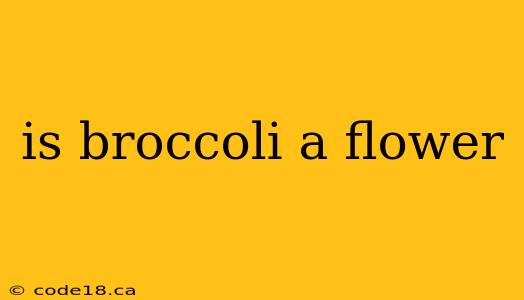Meta Description: Discover the surprising truth about broccoli! Learn why this green veggie isn't just a vegetable, but a flower in disguise, and explore its fascinating botanical classification. Uncover the unique characteristics that make broccoli a unique and nutritious part of your diet. Dive into the world of broccoli and understand its place in the plant kingdom!
Title: Is Broccoli a Flower? The Surprising Truth
What is Broccoli?
Broccoli, that vibrant green cruciferous vegetable we all know and love, is more than just a healthy side dish. It's actually an immature flower. Yes, you read that right! That's why it's considered a flower vegetable. Before the buds open into full yellow flowers, we harvest it for its nutritious florets and stalk.
The Botanical Classification of Broccoli
Broccoli ( Brassica oleracea var. italica) belongs to the Brassica genus, which also includes cauliflower, cabbage, kale, and Brussels sprouts. These plants are all members of the Brassicaceae family (also known as the mustard family). These plants are characterized by their four-petaled flowers arranged in a cross shape.
Broccoli's Life Cycle: From Bud to Bloom
Like other plants in the Brassica family, broccoli begins its life cycle as a seed. It grows into a plant with leaves and a central stem. Then, small buds develop, which are what we harvest and eat as broccoli florets. If allowed to mature, these buds would open into bright yellow flowers, and eventually produce seeds. We prevent this flowering by harvesting the broccoli before the buds mature.
Why We Harvest Broccoli Before It Flowers
Harvesting broccoli at the immature stage, before the flowers fully open, is what gives us the characteristic dense clusters of florets we eat. Once the flowers fully bloom, the plant directs its energy into seed production. The florets become tougher and less palatable. The taste also changes as the plant focuses on reproduction.
Broccoli's Nutritional Value
Broccoli's nutritional benefits are well-documented. It's a powerhouse of vitamins, minerals, and antioxidants. This is because, as an immature flower, it is rich in nutrients intended to support growth and development. These nutrients are great for humans too!
- Vitamin C: Broccoli is a great source of vitamin C, an antioxidant that boosts the immune system.
- Vitamin K: Important for blood clotting and bone health.
- Fiber: Promotes digestive health and helps regulate blood sugar.
- Antioxidants: Helps protect cells from damage caused by free radicals.
Other "Flower" Vegetables
Broccoli isn't alone in the "flower vegetable" category. Many other vegetables we commonly eat are actually immature flower structures or buds. These include:
- Cauliflower: Similar to broccoli, cauliflower is harvested before its flowers bloom.
- Brussels sprouts: These small, cabbage-like vegetables are actually buds that grow along a central stem.
- Artichokes: The edible portion is the flower bud itself.
Conclusion: Broccoli: A Delicious Flower
So, the next time you enjoy a serving of broccoli, remember that you're savoring a delicious and nutritious flower. This green veggie is packed with nutrients and is a versatile ingredient in countless dishes. Its unique botanical classification adds to its appeal, making it more than just a simple side dish. It's a testament to the surprising diversity found in the plant kingdom. Understanding that broccoli is a flower adds a new layer of appreciation for this healthy and delicious vegetable.
